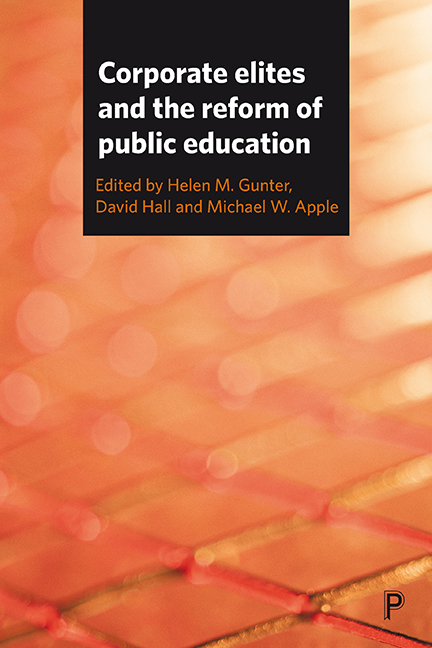Book contents
- Frontmatter
- Contents
- Foreword
- Notes on contributors
- Introduction: Scoping corporate elites and public education
- Part 1 Corporatised governance: system perspectives
- Part 2 Corporatised governance: provision perspectives
- Conclusion: The challenge of corporate elites and public education
- References
- Index
fourteen - The usual suspects? Free schools in England and the influence of corporate elites
Published online by Cambridge University Press: 05 April 2022
- Frontmatter
- Contents
- Foreword
- Notes on contributors
- Introduction: Scoping corporate elites and public education
- Part 1 Corporatised governance: system perspectives
- Part 2 Corporatised governance: provision perspectives
- Conclusion: The challenge of corporate elites and public education
- References
- Index
Summary
Introduction
The recent history of education policy in England has featured a plethora of attempts to increase institutional diversity among state schools. As part of the promotion of choice and competition in quasi-markets, diversity policies have allowed or incentivised varying degrees of overt and covert student selection, including by ‘ability’, faith, curriculum specialism and governance type. One consequence has been the reproduction and expansion of segregation between schools, particularly by socioeconomic status (Gorard, 2014). Diversity policies have also created explicit opportunities for new agents to enter the state education system as dominant school governors or, more accurately, as private providers of state schools (Higham, 2014a). As Woods et al (2007) show, the original academies – set up under the New Labour government from 2001 – were opened predominately by business philanthropists and the Church, reflecting and deepening their wider structural advantages in society. The subsequent growth of multi-academy trusts (MATs) has allowed non-state actors influence over chains of schools.
‘Free schools’ add a new dimension to these policies of diversification. Linked to Prime Minister David Cameron's ‘Big Society’ agenda, the background to free schools is instructive. Before entering government, Cameron (2009, p 5) argued that by becoming ‘too big’ the state was crowding out civil society responsibility, promoting ‘selfishness’ and ‘perpetuating poverty’. The remedy was for communities to take more ownership of ‘persistent societal challenges’ and for government to shrink, while supporting civil society groups with funds ‘from existing state budgets to deliver public services’ (Cameron, 2009, p 9). In taking office in 2010, Cameron invited communities and civil society groups to apply to the central UK Department for Education for the right and the funding to open and govern a new free school in England. The outcome of this ‘demand led process’, the government declared, would depend on proposers coming forward with ‘the vision, drive and skills to set up a new school’ (DfE, 2010, p 59). The guiding aim, Cameron (2011, p 4) argued, was to: ‘break open state monopolies and open them up to new providers, saying – “if you’ve got the ideas and the people and the commitment to tackle our most deep-rooted social problems, come and play a role in our public services”.
- Type
- Chapter
- Information
- Corporate Elites and the Reform of Public Education , pp. 203 - 218Publisher: Bristol University PressPrint publication year: 2017

